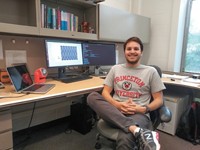Advertisement
Grab your lab coat. Let's get started
Welcome!
Welcome!
Create an account below to get 6 C&EN articles per month, receive newsletters and more - all free.
It seems this is your first time logging in online. Please enter the following information to continue.
As an ACS member you automatically get access to this site. All we need is few more details to create your reading experience.
Not you? Sign in with a different account.
Not you? Sign in with a different account.
ERROR 1
ERROR 1
ERROR 2
ERROR 2
ERROR 2
ERROR 2
ERROR 2
Password and Confirm password must match.
If you have an ACS member number, please enter it here so we can link this account to your membership. (optional)
ERROR 2
ACS values your privacy. By submitting your information, you are gaining access to C&EN and subscribing to our weekly newsletter. We use the information you provide to make your reading experience better, and we will never sell your data to third party members.
Careers
‘Preparing For Real-World Research’
September 5, 2011
| A version of this story appeared in
Volume 89, Issue 36
May 30, page 13: Ironwood Pharmaceuticals’ linaclotide contains 14 amino acids.
June 20, page 24: Clariant continues to operate several research and nonmanufacturing sites in the U.K. Also, its plant in Pontypridd, Wales, will operate into 2012.
July 25, page 18: NIH R&D funding was about $30 billion annually in the early 2000s. Also, Rex Reklaitis assisted the National Institute for Pharmaceutical Technology & Education on its technology presentation in Washington, D.C.
Aug. 8, page 14: Tiger Optics was spun off from Meeco in 2001. It raised more than $250,000 from initial investors.
I enjoyed the article on new methods of teaching research; that is, until I came to the suggestion that this approach should be considered for undergraduates or even earlier (C&EN, July 4, page 31). You have to learn to walk before you can run.
Let us not do what was done to the so-called social sciences. When I was in high school and college we had courses in history, geography, civics, and more. Today these have all been combined into “social science,” and students graduate from high school and college knowing almost nothing of history—even our own country’s—no geography, and unfortunately no civics. So students have absolutely no concept of how our nation is supposed to function or what is in that relatively short document called the Constitution. I see courses in “science” that scatter information all over the map but teach nothing.
I worked for industry and interviewed candidates with Ph.D.s for research positions. What bothered me was not their lack of knowledge about related fields but rather their lack of imagination and curiosity. After three to four years of research they could not think of a single subject that piqued their interest enough to study in greater detail. I found that sad. No graduate will ever succeed if he or she stops learning. One can learn about other fields and how to cooperate while working. We all had to; we all did.
Do we need to improve teaching in the sciences? Of course, but let’s make sure that our graduates know the fundamentals—and how to think.
By Werner Zimmt
Tucson
I found it interesting that the issue of preparing undergraduates for the workforce is only addressed by academia in “Preparing for Real-World Research.” Being ill-prepared comes at the cost of current undergraduates learning that the skill sets they know and master may not be adequate for the workforce. This comes primarily from the way businesses accept and process potential candidates for employment.
During my first year as a college graduate looking for employment, I found employers typically require both an academic degree and an unrealistic amount of experience. I have come across searches that result in a requirement for a bachelor’s degree in chemistry or biochemistry with 20-plus years of experience! What are new graduates looking for employment supposed to do in that situation?
The problem is not academia at all; the problem is employers who are turning a blind eye to the definition of what it means to be an “entry level” chemical professional. It’s clear employers don’t want to spend time training recent graduates in gaining the insight necessary for successful employment. Nor are they making an attempt to understand the practicality of individual undergraduate experiences and skill sets. Everyone in the entry-level boat is a unique individual. They are not inadequate, inefficient, or lacking the necessary skill sets to work in industry. They just have to be given the opportunity to be trained to gain entry into the industrial community.
I attended Mount Union College for my undergraduate training and would not trade up for the “iCons” program that the University of Massachusetts is offering. Mount Union’s undergraduate program focuses on student-driven research on pressing issues in the world today. It combines both real-time research using current literature and a seminar component to deliver the results of that research performed in the lab. The program extends into students composing and designing a literature review, research proposal, presentations, and a final research paper that is patterned after ACS journals. The goal of the “Senior Culminating Experience” at Mount Union College’s department of chemistry is to prepare students for successful graduate school placement and/or meaningful career placement.
Integration is important, but members in academia and industry should remember their traditional academic roots. Everyone who is experienced in industry had a beginning, but it is up to employers to instill a different set of necessary skills to prepare the next generation of chemical professionals with the tools they need not only to make industry better but to make it more meaningful. Academia is correct in trying to correct the imbalance, but the burden should be shouldered by industry and industry alone.
Members in industry, the next time you wonder why your positions are not being filled, consider more than just the time you save in training. Don’t blame the economy or revenue problems; this one is on you. Just look at the first sentence from “Facts & Figures of the Chemical Industry” (C&EN, July 4, page 33).
By Brandon Matthew Alexander
Newport News, Va.




Join the conversation
Contact the reporter
Submit a Letter to the Editor for publication
Engage with us on Twitter